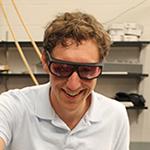
When I came to visit AEP I could see that people in the department were connected in a way I hadn’t seen in other schools. It was a real community here.

The School of Applied and Engineering Physics currently offers a Master of Engineering (M.Eng.) in Engineering Physics and a Doctor of Philosophy in Applied Physics.
The Master of Engineering degree in Engineering Physics (M.Eng.) prepares you for engineering design and development employment or further graduate work. You can broaden and deepen your preparation in AP, or prepare for professional engineering in laser and optical technology, nanostructure science and technology, device physics, materials characterization, or software engineering. Unfortunately, we are unable to offer financial assistance for students in the M.Eng program. Although there are support possibilities within the university, they are very competitive. Financial considerations should include costs for tuition, health insurance, and living expenses. Options for financial aid can be found on the M.Eng Financial Aid Resources page.
Applied Physics is a research-oriented Ph.D. program that provides a flexible graduate education tailored to individual interests. AP combines a core physics curriculum with research and study in one of several areas. Typically, students have a BS in physics, in another physical science (e.g., chemistry), or in an engineering field. Cornell's graduate field of applied physics does not require, and will not consider, GRE scores as part of the application process.

When I came to visit AEP I could see that people in the department were connected in a way I hadn’t seen in other schools. It was a real community here.

I like the idea of being able to understand how things work, and then apply them, and that’s ultimately what led me to pursue a Ph.D. in Applied Physics.

On some level research makes my life more meaningful. When I don’t have the questions and challenges of research in my mind it feels like my brain is floating around without focus. Research grounds me.